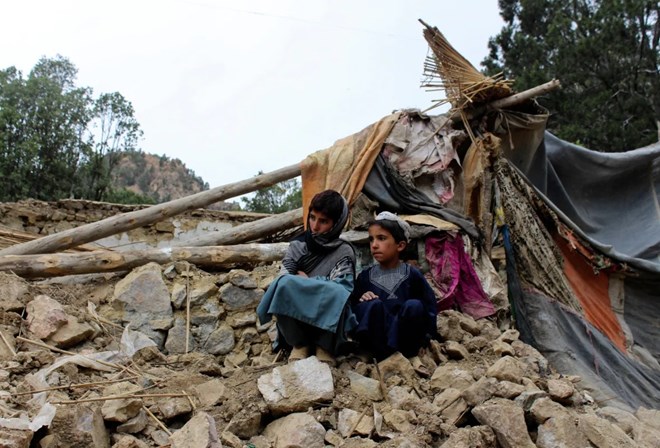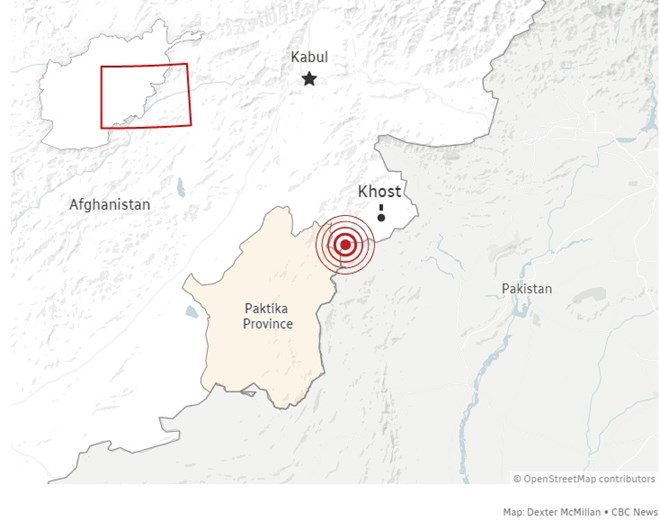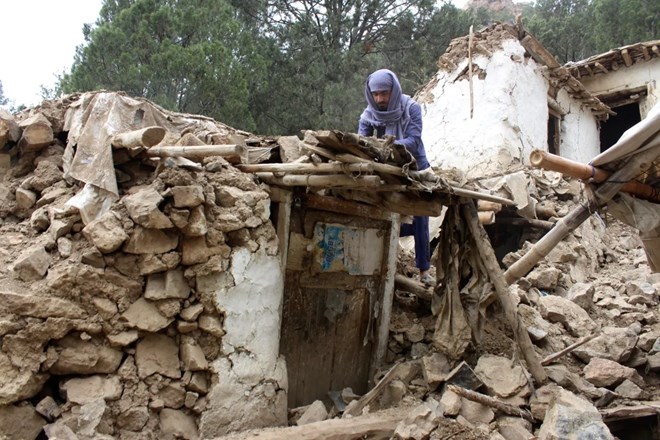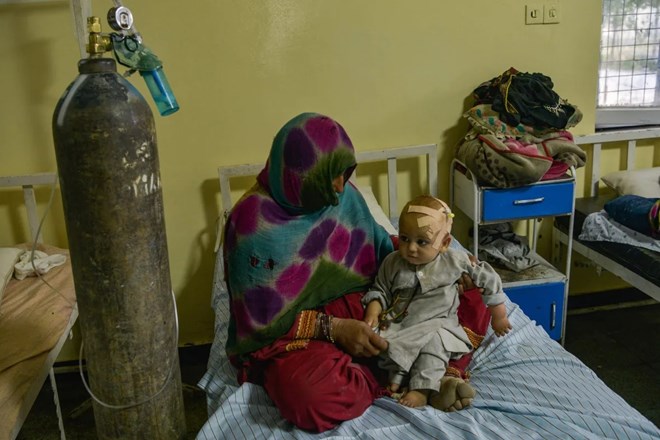
Thursday June 23, 2022
Taliban's supreme leader pleads with international community 'to spare no effort'

Afghan boys sit near their house which was destroyed in an earthquake in the southwestern part of Khost province on Wednesday. (The Associated Press)
A powerful earthquake struck a rural, mountainous region of eastern Afghanistan early Wednesday, killing 1,000 people and injuring 1,500 more in one of the deadliest quakes in decades, the state-run news agency reported. Officials warned that the already grim death toll may still rise.
Information remained scarce on the temblor that hit Khost and Paktika provinces. The European-Mediterranean Seismological Centre put the quake's magnitude at 6.1, though the U.S. Geological Survey (USGS) said it was 5.9.
The death toll given by the Bakhtar News Agency was equal to that of a 2002 quake in northern Afghanistan, making them the country's deadliest since 1998, when a 6.1-magnitude earthquake and subsequent tremors in the remote northeast killed at least 4,500 people.
Neighbouring Pakistan's Meteorological Department said the quake's epicentre was in Paktika, just near the border and some 50 kilometres southwest of the city of Khost.
Footage from the region showed victims being carried into helicopters to be airlifted from the area. Others were treated on the ground.
"We were all sleeping at home... and the room fell over us," said resident Gul Faraz as he received treatment for injuries with his wife and children at a hospital in Paktika. Some family members had been killed, he said.
"All the houses in our area were destroyed, not one, but the entire region has been destroyed."
In a rare move, the Taliban's supreme leader, Haibatullah Akhundzadah, who almost never appears in public, pleaded with the international community and humanitarian organizations "to help the Afghan people affected by this great tragedy and to spare no effort."
Terrain, sanctions may hinder efforts
Mounting a rescue operation will prove a major test for the Taliban. The hardline Islamist group took over the country last August after two decades of war, leaving it cut off from much international assistance because of sanctions. The Ministry of Defence is leading rescue efforts.
Efforts to provide relief and save people trapped under rubble would also face huge challenges due to the terrain and weather, according to one official with the United Nations' disaster risk reduction office.
"The roads are poor even at the best of times so having a humanitarian operation put in place is going to be immediately challenged by the lack of easy access to the area," said Loretta Hieber Girardet, adding that rain, combined with the tremor, created a further risk of landslides.
Recent flooding in many regions has also blocked stretches of highway.
Aid groups respond
Humanitarian agencies still operating in the country, including UNICEF, rushed supplies to the quake-stricken areas. Pakistan said it would send food, tents, blankets and other essentials.
The Afghan Red Crescent Society sent 4,000 blankets, 800 tents and 800 kitchen kits to the affected area, according to Abdul Wahid Rayan, director general of the Bakhtar news agency.
The Italian medical aid group Emergency, which still operates in Afghanistan, said it sent seven ambulances and staff to the areas closest to the quake zone.
Obtaining more direct international help may be more difficult: Many countries, including the U.S., funnel humanitarian aid to Afghanistan through the UN and other such organizations to avoid putting money in the Taliban's hands.
The UN's resident co-ordinator in Afghanistan, Ramiz Alakbarov, said the Taliban had not formally requested that the UN mobilize international search-and-rescue teams or obtain equipment from neighbouring countries.

An Afghan villager collects his belongings from under the rubble of his home that was destroyed in the Spera district of Khost. (The Associated Press)
The quake "will only add to the immense humanitarian needs in Afghanistan, and it really has to be all hands on deck to make sure that we really limit the suffering that families, that women and children are already going through," said Shelley Thakral, spokesperson for the the UN World Food Program in Kabul.
Since sweeping across the country in 2021, the Taliban has worked with Qatar, Turkey and the United Arab Emirates on restarting airport operations in Kabul and across the country — but nearly all international carriers still avoid the country.
Tremors felt in Pakistan, India
In most places in the world, an earthquake of this magnitude wouldn't inflict such extensive devastation, said Robert Sanders, a seismologist with the USGS. But a quake's death toll more often comes down to geography, building quality and population density.
In mountainous areas, "there are rockslides and landslides …. Older buildings are likely to crumble and fail," he said.
"Due to how condensed the area is in that part of the world, we've seen in the past similar earthquakes deal significant damage."
Mountainous Afghanistan and the larger region of South Asia along the Hindu Kush mountains, where the Indian tectonic plate collides with the Eurasian plate to the north, has long been vulnerable to devastating earthquakes.
The European seismological agency, EMSC, said the earthquake's tremors were felt over 500 kilometres by 119 million people across Afghanistan, Pakistan and India.
In 2015, a major earthquake that struck the country's northeast killed over 200 people in Afghanistan and neighbouring northern Pakistan.

An injured Afghan child is treated at a hospital in the city of Sharan in Gayan district, Paktika province, on Wednesday. (Ahmad Sahel Arman/AFP/Getty Images)